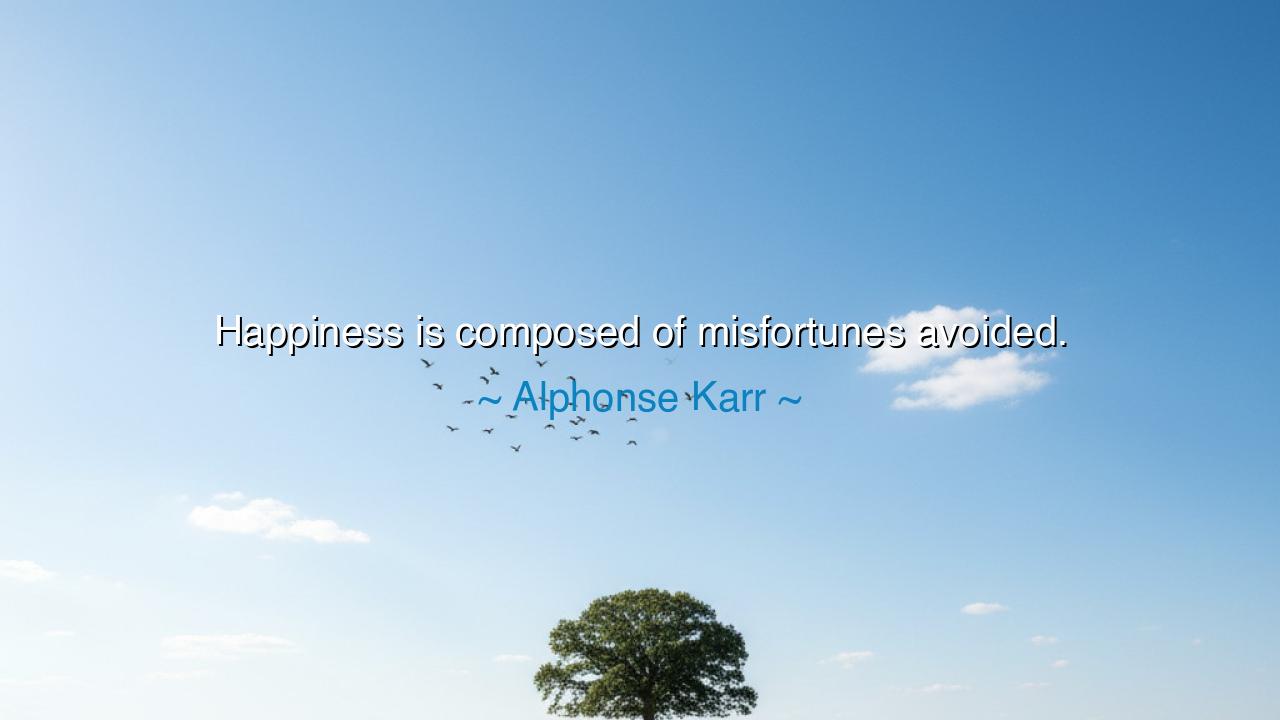
Happiness is composed of misfortunes avoided.






“Happiness is composed of misfortunes avoided.” Thus spoke Alphonse Karr, the French writer and satirist of the nineteenth century, whose sharp mind pierced through the illusions of life to reveal the subtle truths beneath. In this brief yet profound saying, Karr offers a definition of happiness that is neither grand nor naive, but deeply human. He reminds us that joy is often not the gift of extraordinary blessings, but the quiet peace that follows the absence of suffering—that the moments when disaster passes us by, when pain is averted, when loss spares us, are the true, often unrecognized foundations of contentment.
Karr lived in a time of social unrest and rapid change, when Europe was caught between the crumbling of old traditions and the birth of new ideologies. A man of both wit and melancholy, he observed how people forever longed for greater joy, never noticing the misfortunes they had been spared. To him, the tragedy of the human heart was not only in what it endured, but in what it forgot—the daily mercies, the silent protections, the unseen hands that kept sorrow at bay. His words remind us that happiness is not a mountain peak of triumph, but the gentle ground of safety upon which we walk every day, often without realizing its worth.
This teaching speaks with the quiet voice of wisdom that comes from living long and seeing much. For many believe that happiness must be loud and dazzling, filled with laughter and victory. But Karr, like the ancient Stoics, understood that joy is most often found in peace, stability, and the avoidance of harm. The man who avoids ruin is richer than the one who wins fortune. The woman who escapes despair is more blessed than she who chases constant delight. To live without calamity, to dwell in simple well-being—this is the happiness that lasts. It is not the ecstasy of a moment, but the long breath of contentment that comes from gratitude and awareness.
Consider the life of Anne Frank, whose diary became a symbol of human endurance and hope amid horror. For her, even the smallest moments of peace—the glimpse of sunlight through the attic window, the sound of birdsong, the days when no knock came at the door—were treasures beyond measure. In her confinement, she learned that happiness could exist even in narrow spaces, and that the greatest joy was the avoidance of tragedy, the brief reprieve from fear. Her words echo Karr’s truth: that to live one more day free of misfortune is to live in grace.
We, too, often forget this wisdom. We chase after pleasure, success, and perfection, believing that happiness lies in more—more wealth, more beauty, more acclaim. Yet every day we pass unharmed through dangers unseen. Every night we sleep under a roof, untouched by storm or war. Every breath we take without pain is a quiet victory. We fail to notice the disasters that did not come, the losses that did not happen, the illnesses that healed, the friends who stayed. Happiness, as Karr teaches, is not the abundance of gifts, but the absence of catastrophe. To see this truth is to transform ordinary life into a daily miracle.
In this way, his quote calls us to the sacred art of gratitude. It teaches us to turn our eyes not toward what we lack, but toward what we have escaped. The wise man counts not only his blessings, but also his spared sorrows. Each morning that arrives without grief is a hidden blessing; each evening that closes in peace is a triumph. When one learns to live in this awareness, the restless heart finds stillness, for it no longer seeks perfection—it simply gives thanks for preservation.
Therefore, let this be the lesson passed on: Rejoice not only in what you have gained, but in what you have not lost. When the road is calm, remember the storms that could have come. When your loved ones are near, remember the absence that might have been. When you find yourself breathing freely, remember the countless souls who cannot. Such remembrance does not bring sorrow—it brings humility, serenity, and joy. For as Alphonse Karr teaches us, happiness is not the conquest of fate, but the quiet triumph of survival, the silent blessing of a life in which, for another day, misfortune has passed us by.






AAdministratorAdministrator
Welcome, honored guests. Please leave a comment, we will respond soon